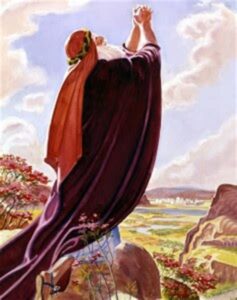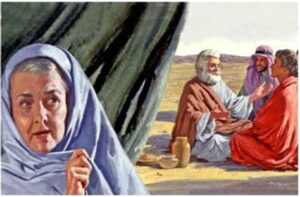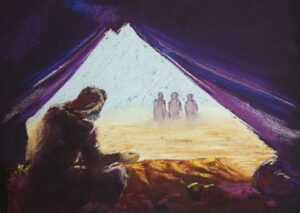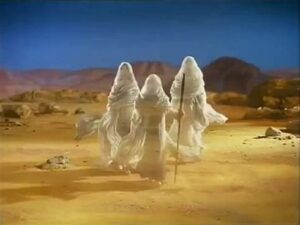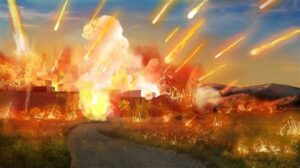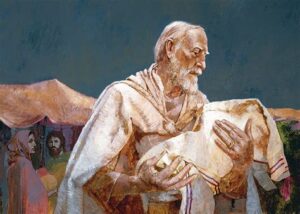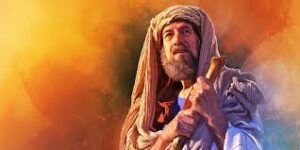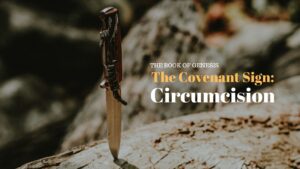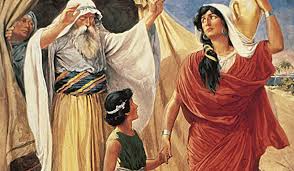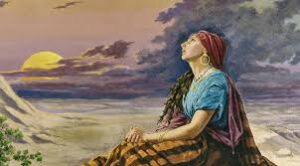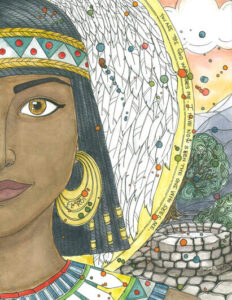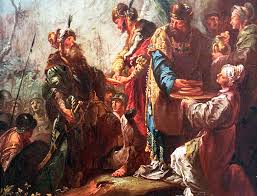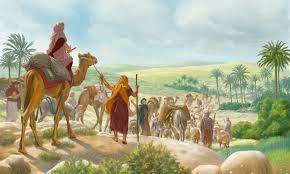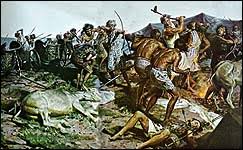Ev – The Outcry Against Sodom and Gomorrah is Great 18: 16-21
The Outcry Against Sodom and Gomorrah
is Great and Their Sin is Grievous
18: 16-21
The outcry against Sodom and Gomorrah is great and their sin is grievous DIG: How had Sodom experienced the power of the Lord more than any city in Canaan? Why did the Lord want Abraham to know His intentions toward Sodom and the rest of the cities? What two reasons did He give? Why did Abraham stay behind?
REFLECT: How has God shown His patience with you? Do you think that patience will ever run out? How is your answer supported from this passage? What does this say about how we should regard our own impatience with others? Do you consider yourself God’s friend? Why or why not? When do the purposes of God become your purposes?
After the message was given to Sarah, it became obvious that the three men had another mission on their minds. When the men got up to leave, they looked down toward Sodom from the hill country of Judah (18:16a). The Dead Sea, eighteen miles to the south, could be seen on a clear day through gaps in the hills.307 There were four cities in the plain, but the sin of Sodom was probably the greatest. That is why it alone is mentioned. The long-suffering of the Lord had run its course and the time for judgment had come. Their sin was inexcusable because they had experienced the power of the Lord more than any city in Canaan. They had been rescued from the four kings of the east (14:1-12), and had heard the testimony of Melchizedek (14:17-24). Even Lot must have witnessed to them at some point, although his compromising lifestyle ruined his testimony. The Lord had given them every opportunity to know Him, yet they chose their sin instead. While homosexuality is a very great sin, their rejection of the Lord was even greater (Matthew 11:23-24).
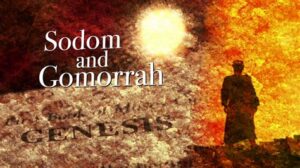
And Avraham walked along with them to see them on their way down toward Sodom (18:16b). As they walked along, Abraham must have overheard the Lord speaking, as it were, to Himself, and yet no doubt intending that Abraham should overhear His words. The Lord wanted Abraham to know His intentions toward Sodom and the rest of the cities. After all, Lot and his family were there. Furthermore, as God’s friend (James 2:23), Abraham needed to know the reason for the terrible destruction the cities were about to experience. He would need to explain it to his children, and they to all their descendants. The desolate region of Sodom would, in the centuries to come, be a perpetual warning to Israel that although ADONAI is gracious, merciful and long-suffering, He is also a God of wrath and will not spare when the time of His judgment comes.308 In the future Jude would write that the cities of Sodom and Gomorrah and the surrounding towns gave themselves up to sexual immorality and perversion. They serve as an example of those who suffer the punishment of eternal fire (see my commentary on Jude, to see link click Al – Like Sodom and Gomorrah, They Gave Themselves Up to Sexual Immorality and Perversion).
It is at this point that we encounter Abraham’s second test. In the first test, ADONAI was helping Abraham see whether or not he would believe that He would do as He had said and give Abraham an heir through Sarah (see Eo – Your Wife Sarah Will Bear You a Son, and You Will Call Him Isaac). Closely associated with this test was another theological examination – could and/or would God perform a miracle in order to keep His promises to Abraham? As we have seen from Paul, Abraham got an A+ on his exam (see the commentary on Romans Bf – The Means of Justification)! But this second test was different.
Then the Lord wondered out loud if He should take Abraham into His confidence, saying: Shall I hide from Avraham what I AM about to do (18:17)? The thrust of this question is essentially, “Is Abraham My friend? I will see if this friend of Mine is truly one with Me in my grace and compassion, as well as in My justice.” Shall I hide from Avraham what I AM about to do is a rhetorical question and the construction in the Hebrew allows for no other answer than a negative reply. No, the Lord would not hide from Abraham what He was about to do. The reasons the Lord would not hide the destruction from him is told us in the next two verses.
The first reason is ADONAI’s covenant with Abraham. The Lord said: Avraham will surely become a great and powerful Jewish nation, and all nations on earth will be blessed through him (18:18). He would have a tremendous influence and become a channel of the Lord’s grace to all the nations on the earth.
The second reason was the spiritual status of Avraham. Once again, the Lord replied: For I have chosen him, so that he will direct his children and his household after him to keep the way of the Lord by doing what is right, which is an internal trait, and just, which is an external trait, so that the Lord will bring about for Abraham what he has promised him in the Abrahamic Covenant (18:19). In fact, the Lord is about to destroy the cities of the plain (19:25) because of their unrighteousness and injustice.
Jesus Christ had deliberately communicated His purposes to Abraham (18:17-19), and this is true of us today. He has revealed His purposes in His word, and through His word believers in ADONAI become His hands and feet on this earth. In view of all these glorious privileges and solemn responsibilities of fellowship with Him, what kind of people ought we to be in holy conduct and godliness (Second Peter 3:11 NKJ)?
The Lord did not actually say in so many words that He was going to destroy Sodom and Gomorrah. He simply said that the outcry from the plain was so great that He intended to investigate. Why this outcry? What was the sin of Sodom and Gomorrah? Their sin started with sexual corruption, self-centerdness, and the thought of getting what you want for yourself with total disregard for the needs of another. From there, it is a short journey to social corruption, an arrogant disregard of basic human rights, and a cynical coldness to the sufferings of others. This is exactly the picture of Sodom and Gomorrah’s sins given by Ezeki’el. Now this is the sin of your sister Sodom: She and her daughters were arrogant, overfed and unconcerned; they did not help the poor and needy (Ezeki’el 16:49). Therefore, social immorality played as large a role in the judgment of Sodom as did the sexual immorality.309
There is a play on words here between two Hebrew words. The word meaning the outcry, is the Hebrew word zakah, meaning a cry, and the Hebrew word for righteousness, is tzedakh. The two words sound very much alike. Instead of tzedakh or righteousness, they get zakah or a cry. Why? Because the sin of Sodom and Gomorrah is so great and so grievous that I will go down and see if what they have done is as bad as the outcry that has reached Me, if not, I will know (18:20-21). The Lord never does anything hurriedly or hastily; He decided to investigate for Himself. It is not as if His omniscience failed Him and He did not know these things. But the point was to show that the Lord had scrutinized every detail. A fair judge sees the evidence first hand.
As the Lord was talking with Avraham, the two angels departed from the hills of Hebron and walked down toward Sodom. However, Abraham, sensing what was about to happen, stayed behind on the road overlooking the Dead Sea plane to plead for those innocent people who had not participated in the wickedness below.



